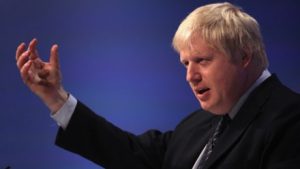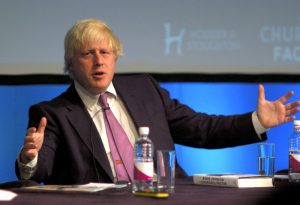
Rising Politician
Churchill and the General Strike

Winston Churchill, Parliament Square, London © Sue Lowry & Magellan PR
April 3, 2009
By Fred Farrow
Proceedings of the International Churchill Societies 1994-95
During the conference at Washington, D.C. last October, I remarked about my good fortune to have been born in England in 1906 at a time when Winston Churchill was in his early thirties. I had the further good fortune to have a grandfather with some small influence in the Conservative Party, which made it possible for me, during the First World War, to be taken to the Stranger’s Gallery at the House of Commons to listen to the debates and, on six or seven occasions, to hear Winston Churchill speak.
Now I must confess that at that tender age, eight to thirteen or fourteen, the subjects of the debates and indeed the details of the speeches were somewhat beyond my comprehension. But I do most dearly remember the atmosphere in the House of Commons when Mr. Churchill was speaking.
It is not unusual, then or now, to enter the House and find a member making a speech which he thinks is very important, but with fewer than a dozen other members present, some engaged in private conversation. Not so when Churchill held the floor. Then the House was almost always crowded. The atmosphere was always either quiet and attentive, with here and there a head nodding as though in agreement; or it was all boos and catcalls. It seemed to me in those days to be mostly the latter. But one thing it was not…the atmosphere was never one of indifference.
As Professor Addison said in the paper he presented at the 1994 Churchill Center Symposium, Mr. Churchill tended to make enemies with his rhetoric. There is no doubt that he was unpopular with a certain liberal element—liberal with a small “l”—a group which was gaining strength in Britain at that time. As time went on there occurred the Antwerp incident, the Dardanelles affair, and other wartime activities in which Churchill was engaged which were unpopular with that particular group. Through it all Mr. Churchill kept his good humor. He was already showing the personality, character, and leadership qualities which served him so well all through his long life, and which saved Britain and indeed the world in later years. He showed that he understood, perhaps better than most men, how government worked. He also showed that he understood himself he had control of himself most of the time.

2024 International Churchill Conference
A leader needs that quality, and Churchill knew who he was. He liked being Winston Churchill. He was well grounded in government. He reached down inside himself and came up with something good because he was made of good stuff He was the kind of man who, when the chips are down and he is put to the test, rises to the occasion and does something extraordinary
When I say he knew himself and liked being Winston Churchill, I am not talking about vanity or conceit but about self-respect, self-confidence. I am also talking about never letting power go to one’s head, nor cynicism to affect one’s actions. Herein lay a great part of his strength of character, which counts more than any other single quality. It counts more than what you know about foreign policy, or what you know about economics, or even about politics. When the chips are down, how do you decide what kind of courage is called for? How do you inspire people to do something they perhaps do not want to do, or perhaps don~t understand? How do you say no to your friends?
Riesman in his book Lonely Crowd talks about inner-directed and outer-directed people. Inner-directed people draw direction, their sense of what they should do and believe in, from something inside. Outer-directed people are much more influenced by public opinion or by the impression they are making on other people; they tend to try to please everybody, which, when you are m a position of leadership, is impossible.
IN THE early Twenties Great Britain, with her empire, her strong navy and her leading role in world trade and shipping, was struggling to recover from heavy losses in manpower and financial resources suffered during the Great War. By the mid-Twenties the trade unions had become so powerful that unless you were a farmer, clergyman, doctor, policeman—or, as I was at that time, a bound apprentice—it was literally impossible to hold a job unless you carried a union membership card. Each trade had its own union: coal miners, steel workers, shipyard workers, engineers, food handers and processors, transportation workers, communications workers, and so on. All were somewhat loosely associated in what was known as the Trades Union Congress (TUC). The most powerful union at that time was the coal miners, and their leaders were certainly the most extreme left-wing, calling even in those early days for nationalization of industry, something they did not achieve until the mid-Forties.
Throughout January and February of 1926, the coal industry, Britain~s sole source of energy, was in turmoil, suffering through numerous strikes in many districts and being saved from even more strife and trouble by a government wage subsidy costing the government £30 million a year. As Chancellor of the Exchequer, Winston Churchill disliked this subsidy but agreed to it because, as he said in a speech to the Belfast Chamber of Commerce on 2 March that year, it gave both the mine owners and the miners a chance to “set their houses in order,” and thus to avoid a dangerous collapse of national industry At Belfast he expressed confidence that industrial strife could be averted. He denied “that foundations of British commerce and industrial greatness have been sapped, that the stamina of our people has been impaired, that our men are mutinous and lazy, that our employers are indolent.” While Churchill agreed that times were difficult, he held that they were slowly getting better. To think otherwise, he concluded, was “idiotic nonsense.
In those years, coal was the primary British export. For all other exports raw material—iron ore, copper, cotton, petroleum—had first to be imported, then made into exportable products. Britain needed exports to stay alive—for example, she only produced about 11 percent of her food. A strident miners union, with the power that it held, had the potential to cause a major economic crisis. And it did.
In 1926, when I was twenty and Mr. Churchill fifty-two, the coal miners union leaders finally announced that at the end of the current contract they would call a nationwide strike unless they were granted what amounted to a substantial increase in pay with an hour less on the day. The contract ended, they duly presented their demands, the mine owners rejected them and the coal strike was on. In early May, after a considerable time during which no coal was produced and negotiations broke down, the TUC called a General Strike of all industry on very short notice.
In a country as industrialized, integrated and as organized as Britain, with a high population density—fifty million people in an area not much larger than the state of Michigan—a general strike is a dreadful thing. A great hush descends over the scene. At the start people even speak to one another in low voices. You get up in the morning, having temporarily forgotten about the strike, to discover that there is no water, no gas, no electricity, no trains, no busses, no streetcars—indeed no transportation of any kind, except perhaps a horse or a bicycle. And very soon there is no food in the stores.
The general strike lasted only about two weeks but on the second day the government declared a state of emergency. This resulted in my being ordered, along with several other young men, to London by army truck, where we were put up in army barracks. Called out at about 3AM the next morning, probably to avoid trouble with pickets, we were told to drive lorries, large army trucks, each with a policeman and a soldier aboard. We learned later that each soldier had only one bullet in his rifle. Our destination was the London docks, where we were to offload food from ships in order to relieve the nationwide shortage.
It so happened that on that first morning I drew the lead truck, so the soldier on my truck was a colonel. When we were all aboard, he called out, “Right, Farrow, such and such a dock” I did not have a due as to where it was but the policeman was a Londoner, so off we went, down to the Thames, where we discovered Navy and Coastguard enlisted men in the thousands, unloading the food ships. It was still dark when we were completely loaded. The eighteen trucks in our group drove by roundabout routes to avoid confrontation with the strikers, to a remote point in one of the parks, where the army was waiting for us and apparently setting up some type of system to handle the food.
On the second day two of the trucks, including mine, were ordered to an address which turned out to be the offices and printing plant of the Morning Post, which had been commandeered by the government to produce a daily newspaper, edited by Churchill and known as the British Gazette. There were, of course, no regular papers, and it was our job to distribute the British Gazette to news vendors in various parts of London, and to an air base where the Air Force could fly them to other cities.
ON THE third or fourth day, while several of us were loading bundles of newspapers into my truck, a large car pulled up in front of the newspaper office just a few yards down the street and several men entered the offices. One of them stopped on the pavement (sidewalk) and stood watching as we young men, chattering among ourselves, tossed bundles of newspapers into the truck. After a moment he started walking toward us, dragging his stick behind him. I looked along at our visitor and realized that it was Winston Churchill.
He came to within a few feet of me and stood watching as we continued to load. Then with a grin he pointed at me and said, “You, young man, you don’t sound like a Londoner—what part of the country do you come from?”
Try to imagine how I felt. Here I was, a young man of twenty, from a family which for two generations had admired this man, the subject of lively discussions around our dinner table. This was the Churchill of the Fourth Hussars, of the Malakand Field Force, of the River War and the Boer War; the Churchill of the relief of Mafeking; the famous war reporter who was captured by and escaped from the Boers. This was the Churchill who, as First Lord of the Admiralty in August 1914 had sent the fleet to its war stations two days before the outbreak of World War I; the Churchill who, as Chancellor of the Exchequer, had presented his second budget to the House of Commons just a few weeks ago. I pitched my bundle of newspapers into the truck, stood up as tall as I could and said, “Sir, I am from County Durham.” I wondered if I ought to salute.
The grin on his face widened and he stepped closer, put his hand on my shoulder and said, “Jolly good. Carry on. God bless you all!” Then with a pat on my back he left us.
AT THAT time the country was in serious trouble. All kinds of ugly threats were being tossed around by both sides and no one seemed to know what to do or where we were heading. Yet Mr. Churchill proceeded to run his newspaper and the treasury department, and to speak out in the House of Commons with confidence and good nature. A week or so later the general strike began to break up, and soon all the trades except the coal miners were back at work It was not until November that the miners offered to return to work, under almost any terms. Unfortunately, since no coal had been produced in Britain for almost a year, the mines had not only lost all their overseas customers, but all coal-using industrial sites had gone cold and required repairs. There was little demand for British coal, and fewer than 25 percent of the miners had jobs to go to. Much unemployment and suffering occurred among the working classes in the North and in the Midlands. Partly as a result, at the next general election in 1929, the Conservative Party was turned out and the Labour Party formed a government with Ramsay MacDonald as Prime Minister.
To justify their existence Labour passed into law very liberal and expensive legislation: make-work projects, 80-foot boulevards to nowhere, unemployment compensation under which a family of six was paid more on the dole than at a full time job. By the early Thirties these and other tax-and-spend policies had brought the country close to bankruptcy. The English pound had plummeted in value.
Churchill labored to bring some sense to the foolishness going on around him, but to no avail. Finally, in desperation, Ramsay MacDonald essentially gave up. At the end of his tether, so to speak, he sought the cooperation of the other two political parties to form a coalition government—to use his words on the radio, “. . .to see what can be done.”
What was done was to bring into the government a number of unelected deputy ministers—businessmen, industrial executives, academics—who instituted stringent and frugal policies, and gradually the future began to hold promise. But just then on the Continent, a great change occurred: Adolf Hitler was elected Chancellor of Germany.
If any in this audience are old enough to remember those days, it did not take ordinary folk long .to figure out that Hitler was after world, or at least European, domination. Similar conclusions were made by those who were advisers to British politicians in power. But most of them were neither politicians nor military men. Winston Churchill was both, and he struggled to convince the government of its duty to safeguard national defense, as it proved, in vain.
It is my opinion that Hitler read the situation in Britain very cleverly. He knew that these businessmen in the government would not wish to put their country back near to bankruptcy by spending their hard-earned resources on ships, tanks, guns and planes to challenge him—that they were much more likely to try to appease him. Thus Hitler gambled, and for a time he was right; but for Winston Churchill and a few others like him, the gamble might have succeeded. In retrospect, one fatal action followed another, as Churchill said in one of his books, Step by Step. So it seems to me that if any one group can be held responsible fir all the carnage, grief and suffering that arose out of the Second World War, it is that comparatively small group of radical trade unionists in the Twenties and early Thirties who created the climate that, if it did not spawn Hitler, sustained him.
© The International Churchill Society. All Rights Reserved.
Subscribe
WANT MORE?
Get the Churchill Bulletin delivered to your inbox once a month.




